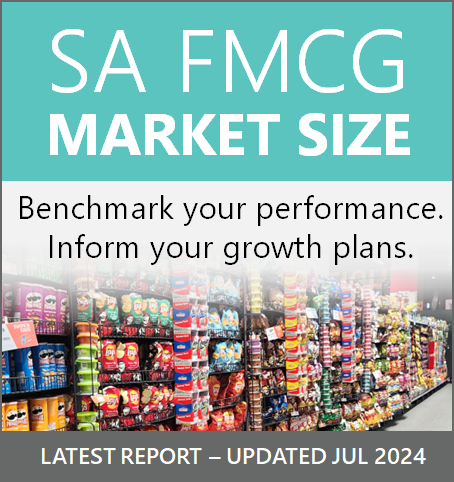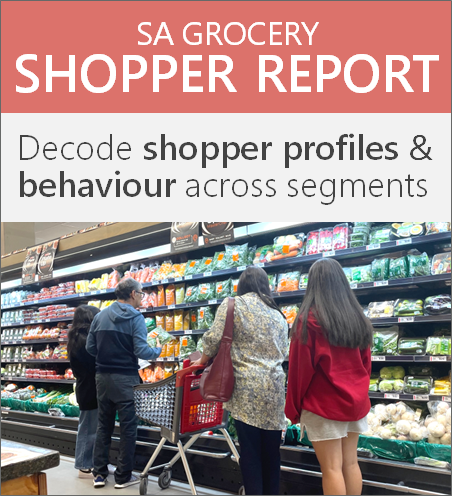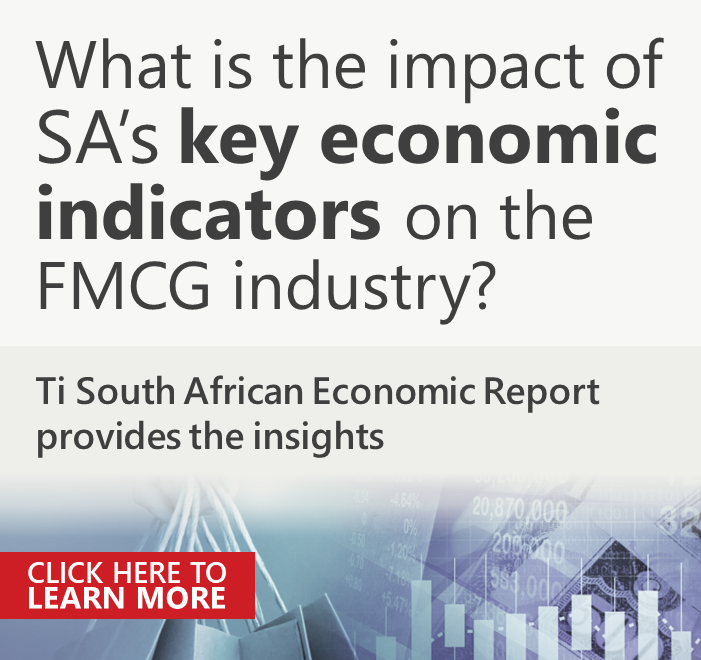
THIS ISSUE: 21 Jan - 27 Jan
A bunch of interim results this week, none of them too worrying, all of them at least a little illuminating about the state of the dear old SA economy. Which has just received a $750m shot in the arm courtesy of the World Bank. Also, a boss move from Futurelife, let’s see how that one flies with the retailers. Enjoy the read.
YOUR NUMBERS THIS WEEK
RETAILERS AND WHOLESALERS
-
Woolworths Food for thought
The new week brings a trading update from The Dapper One, and pretty illuminating it is – not just of the performance of the retailer itself, but also of the forces currently at play in this great sector we call home. That said, turnover was down -2.1% for the 26 weeks through December, impacted by extended lockdowns in Australia and civil unrest back home. Somewhat worryingly, Food – the edible star in the Woolies firmament – grew only +3.8%, although this accelerated slightly to +5.8% over the six weeks of the festive season. It was even outstripped in this instance by Fashion, Beauty and Home, which grew +4.2% over the period, although it did not enjoy the festive bump to the same extent as the rest of the business. The big story, however, was online sales, which grew by +22.4% (including Country Road and David Jones in Oz), contributing a now statistically significant 13.7% to total turnover. And its financial services book (that’s store credit to the rest of us) was up +5.3%, indicating a revival in consumer confidence and indeed buying power after its contraction of -7.8% last year.
Comment: Nothing may be taken for granted in our economy, a fact of which Woolies has always shown itself aware. So the full year numbers may tell a better story.
-
-
Informal Retail Nothing for mahala
One of the stickier of the many challenges facing informal retailers is access to finance (something we cover – and more – in our newest report, Retail in Africa), and with it the ability to keep stores stocked and trading through difficult times. Stepping up to the plate this week – in Zambia, to be clear – are Nestlé, South African Fintech start-up Nomanini and Standard Bank, which have launched Trader Assist, a digital finance solution that enables retailers to sufficiently stock up their shops. Standard Bank is currently onboarding traders at the rate of 20 a week, 70% of whom are eligible for credit after an initial 30-day period, with 80% of these becoming repeat borrowers. The credit in question has gone on to fund between 60% to 80% of the retailers’ trading volumes. “With the Trader Assist programme, we aim to support 10,000 traders in growing sustainable businesses in Zambia,” explains John Ashley, CFO at Nestlé’s East and Southern Africa Region. “We plan to expand our partnership across eastern and southern Africa thereafter.”
Comment: Nice work. It is to be hoped that local retailers will benefit from both the learnings and the largesse of the scheme.
-
-
In Brief Bits and bobs
Good news for Massmart this week, which has been certified as a Top Employer for 2022 from the catchily-named Top Employers Institute, placing the Group among the top 25% of 1,800 employers vying for the certification. “Reflecting on the demanding year that has, like the year before it, impacted organisations across the world, Massmart has continued to show that it prioritises maintaining excellent people practices in the workplace,” says Institute CEO David Plink. Speaking of awards, SPAR’s Rural Hub Programme has won an Absa Business Day Supplier Award. The programme was launched in Limpopo in 2016, with five small-scale farmers producing vegetables on 22 hectares of farmland. Since then, it has expanded to 13 farmers on 126 hectares, providing fresh produce to three of SPAR’s DCs under the Freshline brand. And staying with SPAR, the Jolly Green One has divulged that new CEO Brett Botten will be receiving a basic salary of R7.5m, compared with the R8.6m pocketed by Graham O’Connor previously.
Comment: Excellent work, those forward-looking retailers. People – whether as staff or among the suppliers – remain a retailer’s most valuable assets.
-
-
International Retailers Metafiction
Walmart may be entering the Metaverse, which as we understand it is a big clunky cell phone you strap onto your head. OK, flippancy aside, the business has recently filed a bunch of trademarks which indicate that it may be preparing to flog virtual products such as sporting goods, personal care products, toys, home decor, and electronics, and will be selling non-fungible tokens and virtual currency to its customers. Back in actual reality, German discounter Lidl has just opened its 900th brick and mortar store in the UK, for a total of 50 this past year, and a milestone on its drive to 1,100 by 2025. Another milestone for the business is the Leaping Bunny logo it is now allowed by Cruelty Free International to display on its household and cosmetics own-brand ranges in Great Britain, having achieved necessary compliance. Also in the UK, and an indicator of an industry gradually re-opening its doors to punters, Aldi is unceremoniously jettisoning delivery partner Deliveroo to focus on its own home shopping service. Deliveroo seem unfazed: “Despite a challenging backdrop, we continued to strengthen our customer proposition, widen our customer base and execute against our strategy,” says CEO Will Shu.
Comment: Big news from Walmart, which will soon be dressing us all in inexpensive, generously sized virtual garments during our Zoom meetings.
-
Futurelife Cereal number
A bold move from beloved cereal brand Futurelife, which announced this week that it would be launching an online store to supplement its more traditional bricks and mortar channels. “Consumers will still be able to find all their usual Futurelife products in-store but through our online store, our loyal customers will also have instant access to all of the breakfast cereals, lunchbox favourites and other Futurelife pantry staples they love,” explains MD Mark Bunn. To encourage punters to shop online, the brand will be offering a multitude of online-only benefits including special offers, discounts and combo deals, subscriptions, and limited-edition gift packs. The business tested the appetite for the platform in a recent Facebook survey, in which 10,514 of the 10,847 customers surveyed said they were all in for online, and even more of them said they would be up for a loyalty programme too.
Comment: Fair enough, but how will this wash with the buyers? Futurelife must be very bullish indeed on their current position – and on the continued post-COVID growth of online.
-
-
In Brief So long, and thanks for all the fish
Congrats this week go to Richard Rivett-Carnac, the spanking new CEO of SAB, who comes to the role with 13 years of AB InBev, most recently as VP for finance, legal and corporate affairs for AB InBev’s Africa Zone. Hellos and Goodbyes: also this week, Pioneer announced that it would be discontinuing its venerable Peck’s Anchovette and Redro brands, due to declining consumer demand. Pecks began life in Britain in 1891, arriving on these shores in the 1960s. Back to booze, and Distell has grown revenue in South Africa +20% in the six months through December, with much of that coming from stellar sales of cider brands Savanna and Hunter’s and of its ready-to-drink stable, including Bernini, Esprit and Klipdrift & Cola. And speaking of Cola, CCBA reported a +14% growth in revenue to $3.2bn through December and expects the value of total volumes to grow from $12.1bn in 2021 to $18.4bn this year. Finally, listed investment outfit Labat Africa has acquired a 100% share in Miami-owned CBD lifestyle brand Echo Life, and has obtained exclusive rights to distribute ready-rolled hemp Ace & Axle joints, and other products including tinctures and snack bars.
Comment: Out with the fish paste, in with the weed, then eh? It’s a funny old world, and no mistake.
TRADE ENVIRONMENT
-
The Economy Banksy
Hurrah for the good-old World Bank, sprinkling largesse (and extracting commitments) wherever it goes! The big beneficiary this week is none other than the R.S. of A. – that’s us – to whom the Bank has offered a loan of US$750m (that’s about 11.4 billion ronts) to kick start our fiscus after the depredations of COVID-19. Specifically, say the Bank and our Treasury in a joint statement, “This loan will support the government of South Africa’s efforts to accelerate its COVID-19 response aimed at protecting the poor and vulnerable from the adverse socio-economic impacts of the pandemic and supporting a resilient and sustainable economic recovery.” The low-interest development policy loan (DPL) is designed to enhance financial sector stability with the establishment of a deposit insurance scheme and will support South Africa’s commitment to climate change. It will help finance health and social safety net programmes and support our efforts to build back better after the pandemic and its associated economic crises.
Comment: A vote of confidence from an institution that prefers to vote with its wallet.
Sign up to receive the latest SA and international FMCG news weekly.
Tatler Archive
“As I speak to you, I’m a broken man... I fear that I’m going to have to start using either Bovril or marmalade or, heaven forbid, sandwich spread on my toast.”








1.png)
